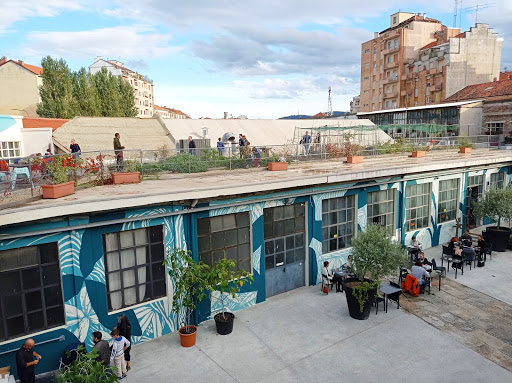BeeOzanam is a community hub whose challenge is to combat cultural poverty and social exclusion, stimulating the growth of a sustainable generation through the co-production of cultural, educational and aggregative activities.
Following the deindustrialisation of the city of Turin, several workers’ districts scattered across the city generated many empty spaces that were once factories, workshops and structures related to the supply chain of large national companies such as FIAT, INCET and Lancia. In addition to rising unemployment rates, many suburbs have subsequently shrunk to mere residential areas, exposing a weakened and dozing social fabric. Luckily, there are examples of organisations that contribute to urban regeneration, recovering large empty spaces and filling them with activities aimed at rebuilding social relations while offering useful services, opportunities for professional growth and cultural activities. Bee Ozanam is a community hub whose challenge is to combat cultural poverty and social exclusion, stimulating the growth of a sustainable generation through the co-production of cultural, educational and aggregative activities.
The BeeOzanam project was initiated by Loris Passarella, president of Meeting Service Catering, a social cooperative based in Turin that focuses on training people in catering, gardening, bee-keeping and other activities related to food. Founded in 1988, it was initially based in a small office in the city centre – this forced them to work in several locations in order to offer courses, so when news came that the municipality was planning on repurposing an old factory building, they moved in and opened their first restaurant that also functioned as a training ground for their students. This was the beginning of a new adventure, now set to become a huge community hub for the area and beyond.
We met Loris in BeeOzanam’s green rooftop terrace on an autumn day in 2020, when locals were out and about, to explore together the initiative’s history and current projects.
Meeting Service Catering has been operating on in Turin for several decades now, when did you move here?
Our activity started in 1988, but we settled here in Borgo Vittoria in 2006, when we opened the restaurant and started to use the place for courses in the field of restaurant and hospitality. Nowadays we offer training courses in catering, mainly addressed to disadvantaged minors, psychologically challenged people and unemployed youngsters. We don’t only operate here: since 2015, we manage Qui Da Noi, a cafè in the Fabbrichetta neighbourhood and since the end of December 2018 we manage Caffè del Borgo Ozanam at the Medieval Village (a reconstructed 15th century Piedmontese village built in the end of the 19th century located in Parco del Valentino, a UNESCO World Heritage Site). Last but not least, we run a student canteen in Collegium Trinitatis, a university residence.
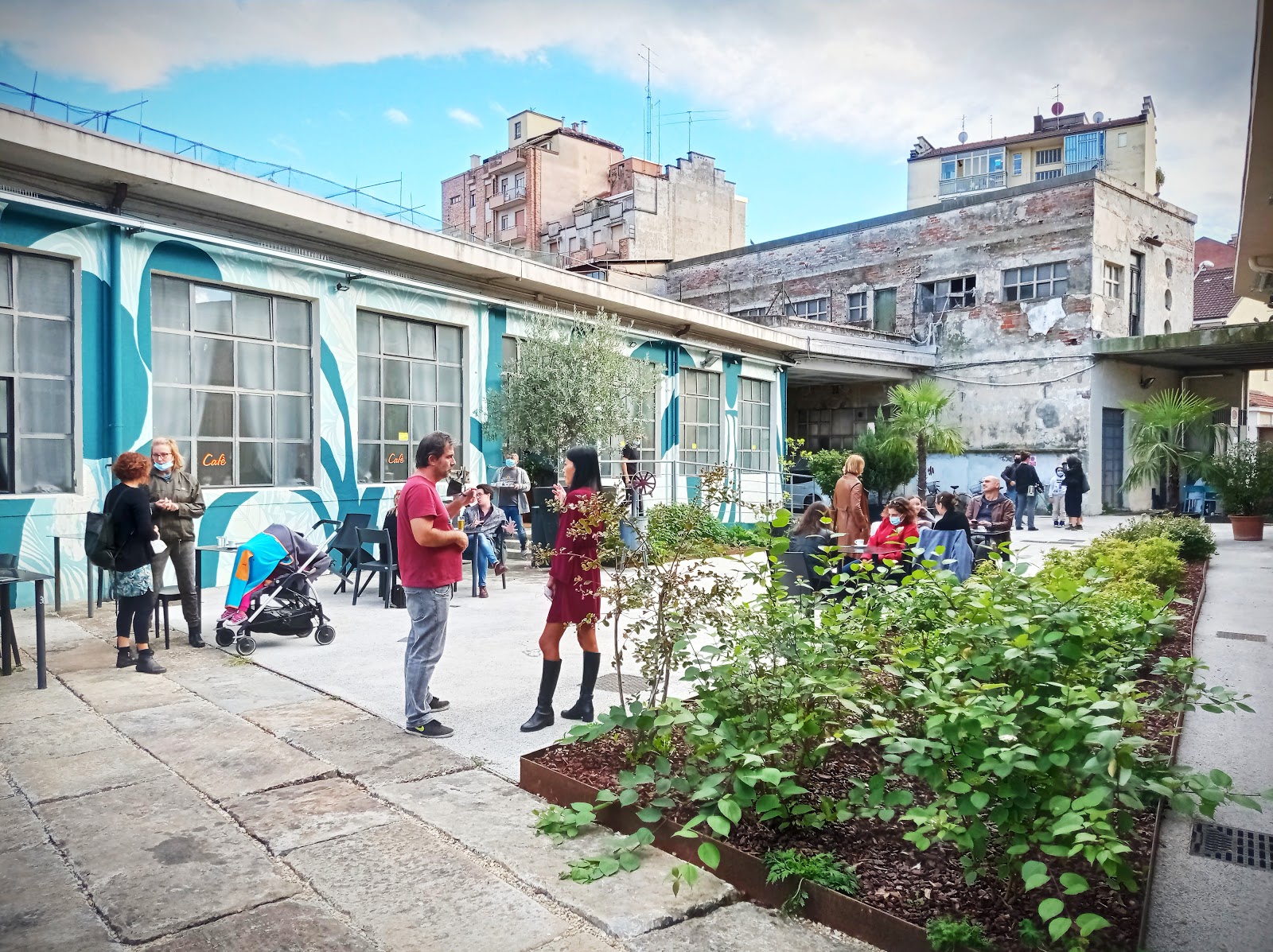
What is behind the name of this community hub?
BeeOzanam takes its name from Federico Ozanam, one of the founders of Società di San Vincenzo de Paoli, an international voluntary organisation. This place was born as a foundry and operated until the 70s, when the owner, SIMBI metal foil manufacturer moved out of the city. One wing of the building was used by the municipality as a temporary home for families from the South who hadn’t yet found a home, and was called Casa Ozanam. The municipality then used most of the remaining part of the building to house clinics from the National Healthcare System, and towards the beginning of the ‘90s the local government started to house carpentry, tailoring, hairdressing and bicycle workshops, along with catering courses, for disadvantaged youth. The bee is a symbol of industriousness, respect for the environment, essential service.
BeeOzanam lies in the heart of Borgo Vittoria, home to approximately 50,000 residents and a typical example of a district that lost most of its productive activities. Borgo Vittoria was once a village just outside of Turin whose main activities were related to the lumber industry and agriculture. It later became part of the city during the industrial boom, when both factories and residential areas were built to boost production. In this area of the city, it is noted that the deindustrialisation process has severely weakened the social fabric. The rising unemployment rates and the scarce leisure opportunities in the area make it paramount to insist on both creating chances for urban regeneration and community-building.
What brought you to this part of the city?
We came here in 2006 because of a project within the framework of the local government aimed at recovering the several empty spaces in the district. This space was in very bad conditions, but the venue itself is wonderful: it’s the result of Bulgarian architect Nikolaj Diulgeroff’s work, who merged the structures in the late 1930s, giving it a shape which reminds one of a boat, a rare example of Futurism in Turin. And with all this space at our disposal, we were ready to evolve – we surely didn’t want to limit our activity to courses, we wanted to give our students the opportunity to learn while working. That’s when we decided to also open a restaurant, “Le Fonderie Ozanam” (The Ozanam Foundries).
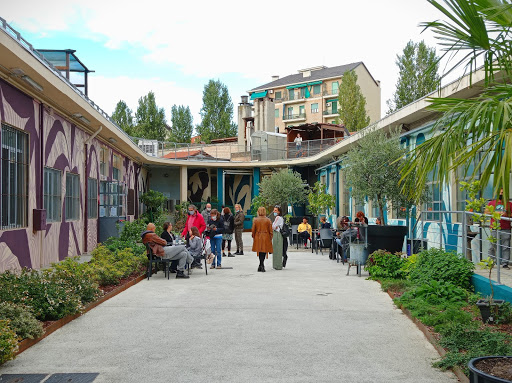
How long did it take you to take the next steps and become BeeOzanam?
BeeOzanam was born from the meeting of third sector entities that work in the field of urban regeneration, sustainability, youth work, training, multiculturalism, urban art and social catering. Actually, until very recently we were commonly known as Casa Ozanam, but we evolved. In 2012, ERI Onlus moved into the building and regenerated some of the empty spaces establishing Ozanam House, a CAS (Extraordinary reception centre for asylees) thanks to which over twenty people now have a place to stay, they are learning Italian and are also receiving professional training in several fields, in addition to legal support for their asylum requests. In 2016, rooftop garden builders Orti Alti began to work on a vegetable garden on the rooftop of the place. This gave a new impulse to the whole project, and winning a Co-City grant in 2018 that allowed them to use another wing of the building confirmed the right direction – two more entities joined in, in order to enlarge the vision and the mission of the place. Minollo is an association dealing with after-school educational activities for kids, while Pigmenti is an association for the promotion of screen printing and street art. We hope that this project will soon include more entities, but most of all, the people of Borgo Vittoria and Madonna di Campagna. We want this to become a community hub, using parts of the building for a series of cultural activities, workshops and services – for example, we will soon open our own fab-lab and a large space that can be used by the people of the neighbourhood for events and conferences. This wants to be a place that gives answers to both the neighbourhood and the city.
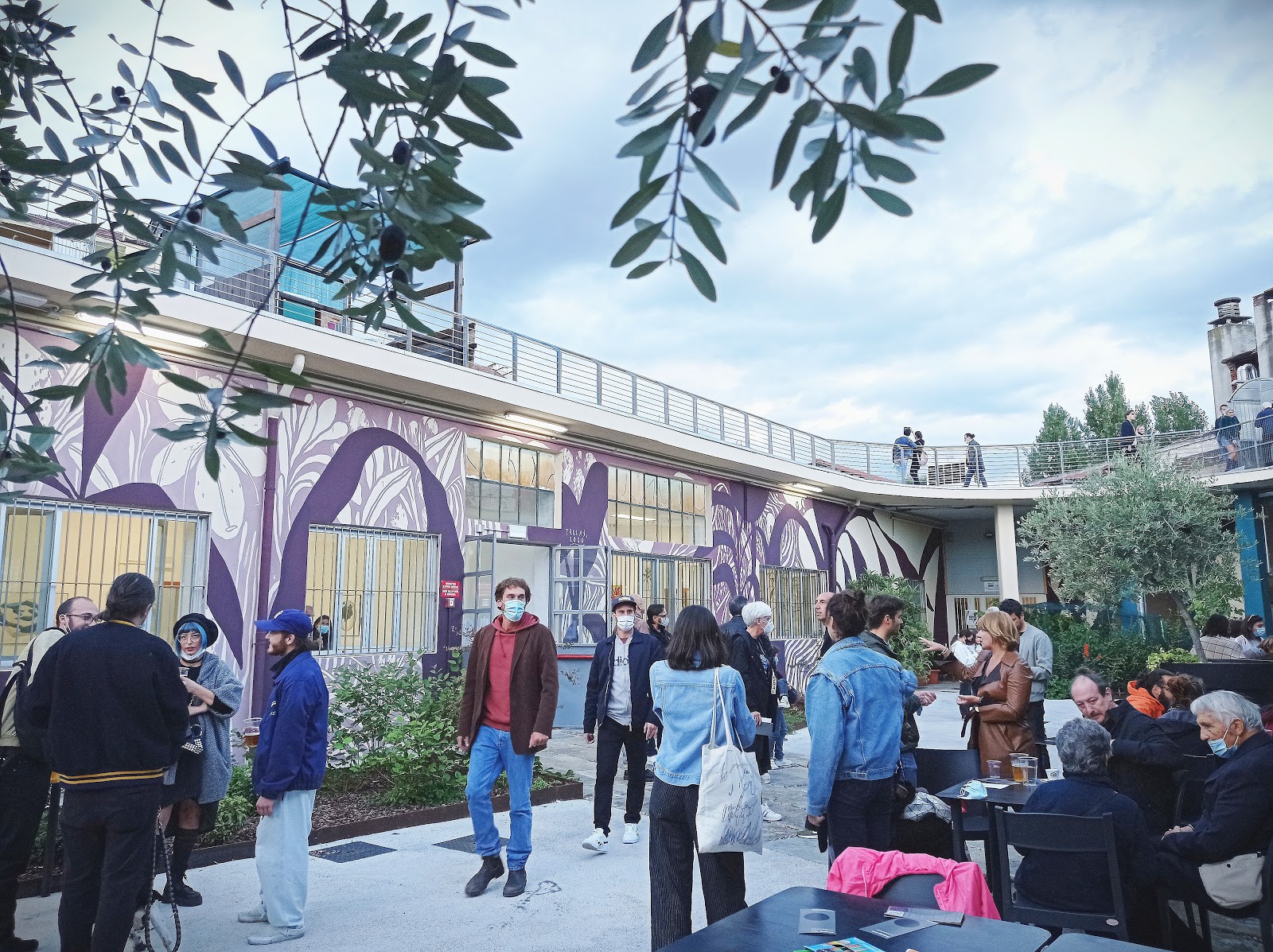
On the roof, we decided to build a garden full of flowers for bees, placing three hives at its centre. We are very satisfied with results – for example, two years ago they produced 110 kg of honey (wildflower, acacia and linden). The bees are healthy, and it seems that they produce more in the city than in the countryside due to the lower quantity of herbicides and poisons. Last but not least, this building still houses offices of the Local Health Service (ASL) linked to the activities of the motorisation office of the Ministry of Transport, however is about to relocate elsewhere, and there is also a gym run by the local government (now closed due to the present Covid pandemic, but up to open again).
How did the residents of the neighbourhood react to your presence?
Many people in the neighbourhood don’t even know we exist. Not only does it take time to build a solid relationship with a whole district, the Covid-19 pandemic has further slowed down the process. Thanks to the Rincontriamoci grant from Compagnia di San Paolo, we have organised a series of free-of-charge social dinners for the locals, and in the first weekend of October we hosted Beepop Fest, a two-day event dedicated to food, art and music that showcased all the potential of the place.
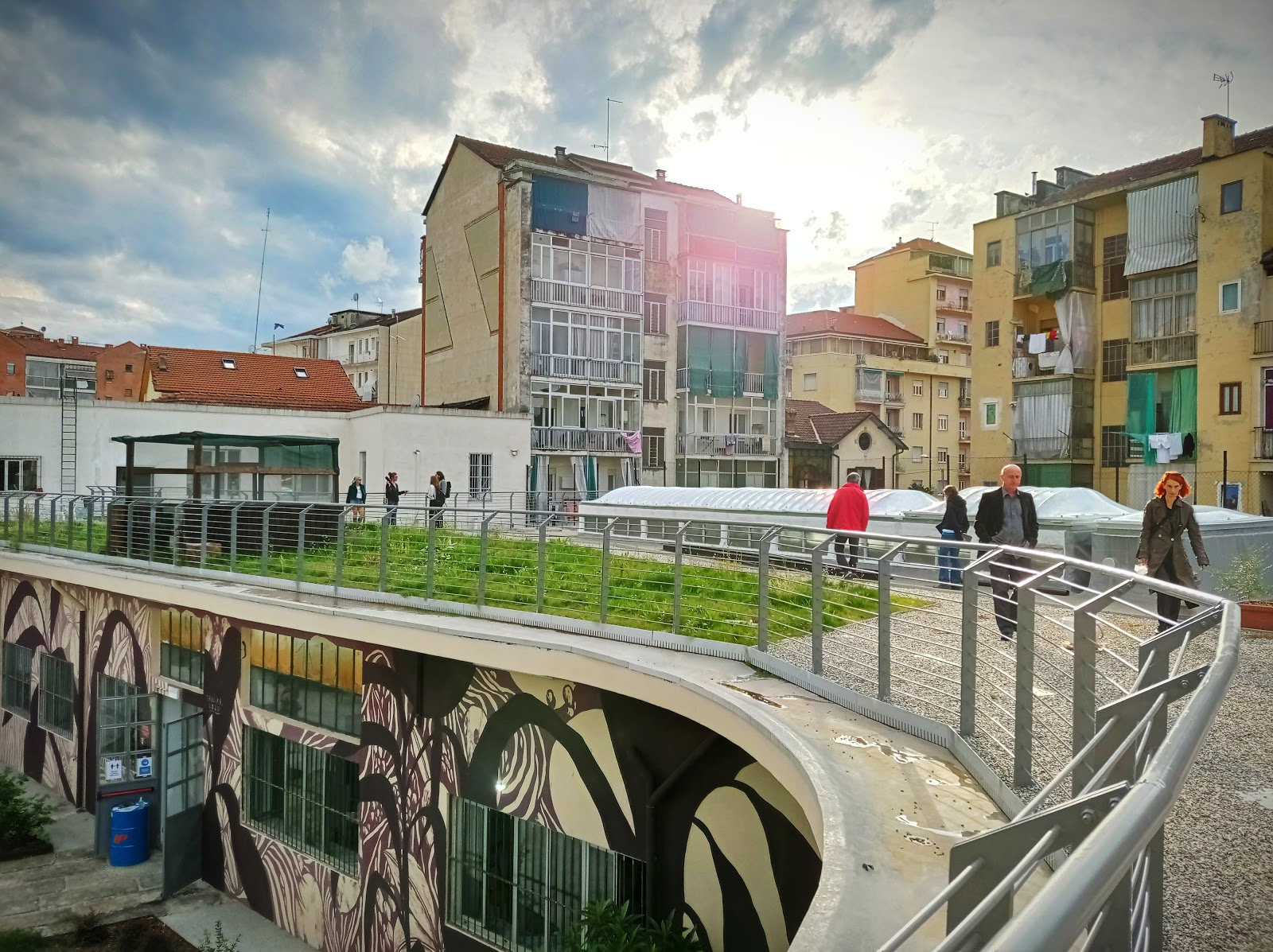
In the end of October we also launched Beeloved #DiariodiComunità, a collection of movies and pictures that can tell the story of the neighbourhood, in partnership with the local government, Compagnia di San Paolo and the National Corporate Film Archive. The restaurant operates through delivery service when anti pandemic measures don’t allow us to host the public.
Le Fonderie Ozanam, our restaurant, is open from Monday to Friday for lunch, when we offer budget meals for workers, in the evening only on Thursdays, Fridays and Saturdays (pizzeria and restaurant with a slightly more refined menu). We are also available for groups on Sundays, and we will soon open a bar. This restaurant has one very special feature – a public roof garden with a bee-keeping station. The roof has been completely rebuilt to encourage cultivation, and our tomatoes, courgettes, aubergines, peppers and lettuce are some of the vegetables that we use in the restaurant. We would have liked to build an even larger vegetable garden, but due to the bearing capacity of the roof we would have had to modify parts of the structure, so we decided to reduce its extent. This was the first roof garden in Turin to also have social and educational value, something we are really proud of.
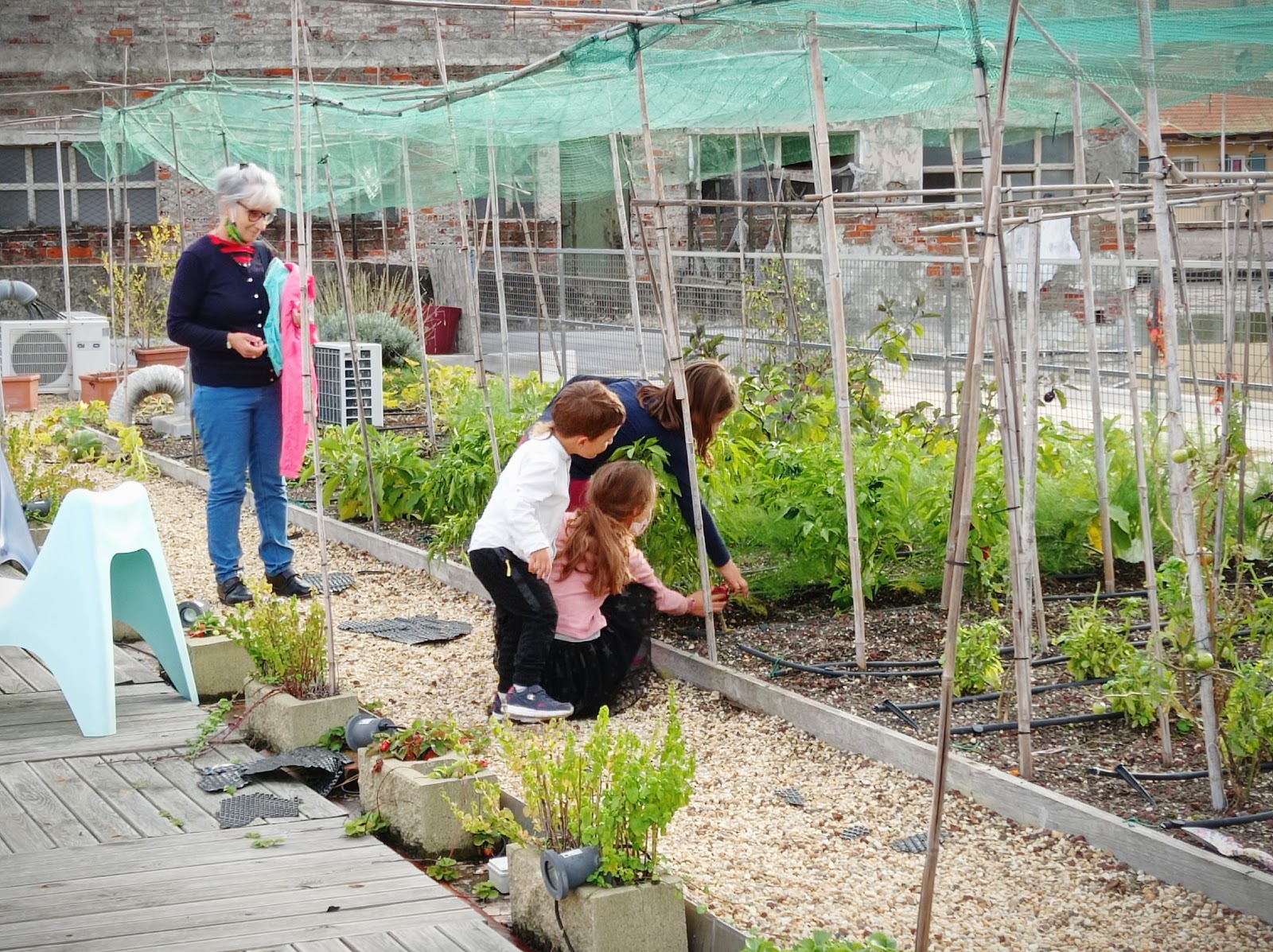
How is BeeOzanam managed?
The organisational model of BeeOzanam is very similar to the one used by the network of Case del quartiere, community or “commons” spaces like Cascina Roccafranca or the Bagni pubblici di via Agliè 9, run by independent associations but in collaboration with the municipality offering services, hosting workshops and organising cultural activities in many of the neighbourhoods of the city – that is exactly our goal. Co-City brought us closer to this network. We might even become a new Casa del Quartiere in the future.
Will the activities be heavily affected by the lockdown?
As a cooperative, we will surely be penalised by the state of affairs, but we are mostly worried about our most disadvantaged students – they will be forced to stay in their homes, and social relations are as important to them as their education. However, our restaurant is still open for delivery and take away service, and we are also starting to sell our products from the vegetable garden (sauces, jams and other delicacies).

In a time of crisis like the current Covid-19 pandemic, are there other initiatives you are carrying out to keep closer to the neighbourhood?<
New associations will also join in from November 2020, and we are about to communicate the availability of BeeOzanam to help the residents of the neighbourhood once a week, with services such as doing the shopping and running other errands, such as going to the pharmacy, handing in documents, paying bills at the post office etc.
https://www.facebook.com/beeozanam/
Interview by Andrea Giuliano.

